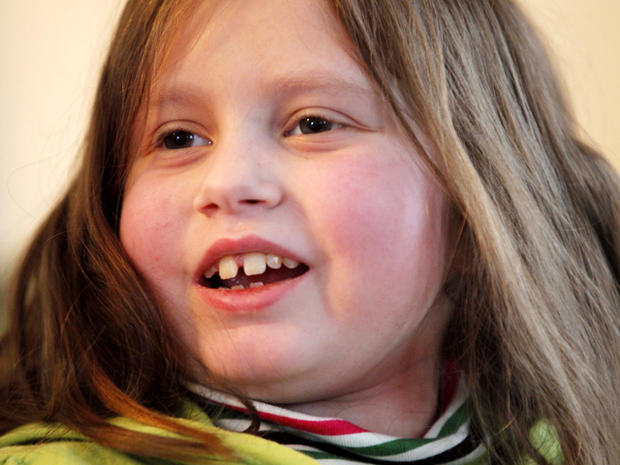Maine girl home after 6-organ transplant
(CBS/AP) Nine-year-old Alannah Shevenell is home from a Boston hospital with six new organs. The 9-year-old Maine girl received a new stomach, liver, spleen, small intestine, pancreas, and part of an esophagus to replace the ones that were being choked by a huge tumor.
It's believed to be the first-ever transplant of an esophagus and the largest number of organs transplanted at one time in New England.
In 2008, Alannah, then 5, began running a fever and losing weight while her belly swelled. Doctors discovered a tumor that year and twice attempted to remove it, as it made it spread from organ to organ. But it was difficult to reach what turned out to be a rare form of sarcoma, said Debi Skolas, Alannah's grandmother, and chemotherapy didn't do the trick.
The growth - known as an inflammatory myofibroblastic tumor - continued to grow in her abdomen, causing pain, making it hard to eat and causing Alannah to swell up with fluid. Surgery was the last resort to save her life, and Alannah spent more than a year on a waiting list for the organs, said Dr. Heung Bae Kim, the lead surgeon on the procedure at Children's Hospital Boston.
The family was told there was a 50 percent chance Alannah wouldn't survive the procedure - but without it, she had no chance whatsoever.
In October, doctors prepared to remove the growth and the organs in one fell swoop and replace them with organs transplanted in one tangled piece from another child of similar size.
The hardest part was taking out her organs and the tumor, Kim said, calling it a difficult operation with lots of blood loss.
"It's probably one of the most extensive tumor removals ever done," the surgeon said.
Dr. Allan Kirk, professor of surgery at Emory University in Atlanta and the editor-in-chief of The American Journal of Transplantation, said no other esophageal transplant has been reported in medical literature.
After the surgery, Alannah spent three more months at the hospital. She battled infections and complications from the surgery before finally being given the OK to leave.
Healthy, active, and with high hopes, Alannah said Thursday that she's glad to be feeling well again and able to go sledding, make a snowman, work on her scrapbooks and give her grandmother a little good-humored sass.
The best part? "Being home," she said. "Just being home."
Even at home, Alannah has to take nine medications each day, some two, three or four times. Her grandparents have to precisely measure what goes in and comes out of her body, and check her blood sugar.
She has an ostomy pouch - a prosthetic device that collects waste - and a feeding tube attached to her for nutrition as she slowly gets used to eating again.
Her immune system is so weak that she can't go to places with large numbers of people. She can't eat raw vegetables or fruits unless they have thick skins because of concerns over germs, and she'll never be able to swim in a lake because of the bacteria.
WebMD has more on organ transplants.
